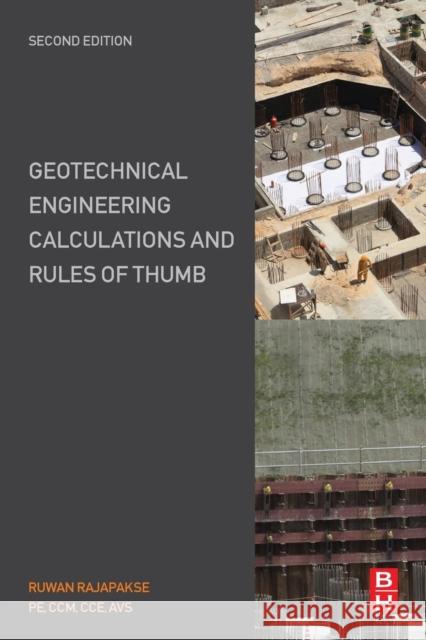Geotechnical Engineering Calculations and Rules of Thumb » książka
Geotechnical Engineering Calculations and Rules of Thumb
ISBN-13: 9780128046982 / Angielski / Miękka / 2015 / 508 str.
Geotechnical Engineering Calculations and Rules of Thumb, Second Edition, offers geotechnical, civil and structural engineers a concise, easy-to-understand approach to selecting the right formula and solving even most difficult calculations in geotechnical engineering. A "quick look up guide," this book places formulas and calculations at the reader's finger tips. In this book, theories are explained in a "nutshell" and then the calculation is presented and solved in an illustrated, step-by-step fashion. In its first part, the book covers the fundamentals of Geotechnical Engineering: Soil investigation, condition and theoretical concepts. In the second part it addresses Shallow Foundations, including bearing capacity, elastic settlement, foundation reinforcement, grillage design, footings, geogrids, tie and grade beams, and drainage. This session ends with a chapter on selecting foundation types. The next part covers Earth Retaining Structures and contains chapters on its basic concepts and types, gabion walls and reinforced earth walls. The following part covers Geotechnical Engineering Strategies providing coverage of softwares, instrumentation, excavations, raft design, rock mechanics, dip angle and strike, rock stabilization equipment, soil anchors, tunnel design, seismology, geosynthetics, and slurry cutoff walls. The final part is on Pile Foundations including content on design on sandy soils, clay soils, pin piles, negative skin friction, caissons and pile clusters. In this new and updated edition the author has incorporated new software calculation tools, current techniques for foundation design, liquefaction information, seismic studies, laboratory soil tests, geophysical techniques, new concepts for foundation design and Dam designs. All calculations have been updated to most current material characteristics available in the market. Practicing Geotechnical, Civil and Structural Engineers may find in this book an excellent companion to their day-to day work, benefiting from the clear and direct calculations, examples, and cases. Civil Engineering students may find particular interest in the concise theory presented in the beginning of each chapter.
- Calculations both in FPS and SI metric systems;
- Convenient access to all needed calculations;
- Access to concise theory that helps understand the calculations;
- Case studies from around the world;
- Includes new software calculation tools.











